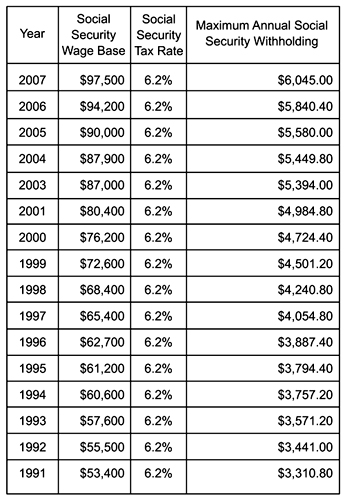Social Security and Medicare Taxes (cont.)
Social Security and Medicare taxes, also known as FICA taxes, must be withheld from employees' wages. Employers must pay a matching amount of FICA taxes for their employees. As of 2007, the Social Security tax rate is 6.2%. Employees have 6.2% withheld from their wages for Social Security taxes, and employers pay a matching amount in Social Security taxes until the employee reaches the wage base for the year. Once that amount is earned, neither the employee nor the employer owes any additional Social Security tax.
The Medicare tax rate is 1.45%. The employer must withhold 1.45% of an employee's wages and pay a matching amount for Medicare tax. Unlike the Social Security tax, there is no maximum wage base for the Medicare portion of the FICA tax. The employer and the employee pay Medicare tax regardless of total earnings.
Unemployment taxes:
Employers must also pay State and Federal Unemployment Taxes (SUTA and FUTA). The FUTA rate is 6.2%, but normally nets to 0.8% because the employer is allowed to take a credit of up to 5.4% for SUTA taxes paid. (This will be the case if the employer is eligible for maximum credit.)
The wage base for FUTA is $7,000 (i.e., the employer is liable for FUTA only on the first $7,000 of the compensation paid to each employee per calendar year). Each state has different rates, so employers must consult the state requirements for applicable state tax rates and the maximum wage base. Many states require new businesses to have an average starting rate until an employment history is created. For example, Indiana requires new employers to pay 2.7% for the first 3 years. After that, the rate is adjusted depending on various factors, including whether ex-employees file a request for unemployment benefits.
Historical Social Security, employee wage tax base:
The table below shows taxes collected from employees. The employer pays another 6.2% and through the theory of tax incidence, the entire 12.4% in payroll taxes is paid for by the employee (half directly to the government, half in the form of lower wages).
